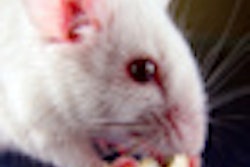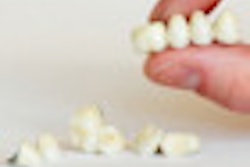Researchers from King's College London have developed a new method of replacing missing teeth with a bioengineered material generated from a person's own periodontal cells, according to a new study in the Journal of Dental Research (March 4, 2013).
Research toward producing bioengineered teeth has largely focused on the generation of immature teeth (teeth primordia) that mimic those in the embryo. These embryonic teeth can then be transplanted as small cell pellets into the adult mandible to develop into functional teeth.
Despite very different environments, embryonic teeth primordia can develop normally in the adult mouth. If suitable cells can be identified that can be combined to produce an immature tooth, there is a realistic prospect bioteeth can become a clinical reality, according to the King's College London researchers.
They isolated adult human periodontal tissue from patients at the Dental Institute at King's College London, grew more of it in the lab, and then combined it with the cells of mice that form teeth. By transplanting this combination of cells into mice, the researchers were able to grow hybrid human/mouse teeth containing dentine and enamel, as well as viable roots.
Epithelial cells derived from adult human periodontal tissue are capable of responding to tooth-inducing signals from embryonic tooth mesenchyme in an appropriate way to contribute to tooth crown and root formation, and give rise to relevant differentiated cell types, following in vitro culture, the researchers found.
Easily accessible epithelial cells are thus a realistic source for consideration in human biotooth formation. The next challenge is identifying a way to culture adult human mesenchymal cells to be tooth-inducing, because researchers now can only make embryonic mesenchymal cells do this, the study authors concluded.



















